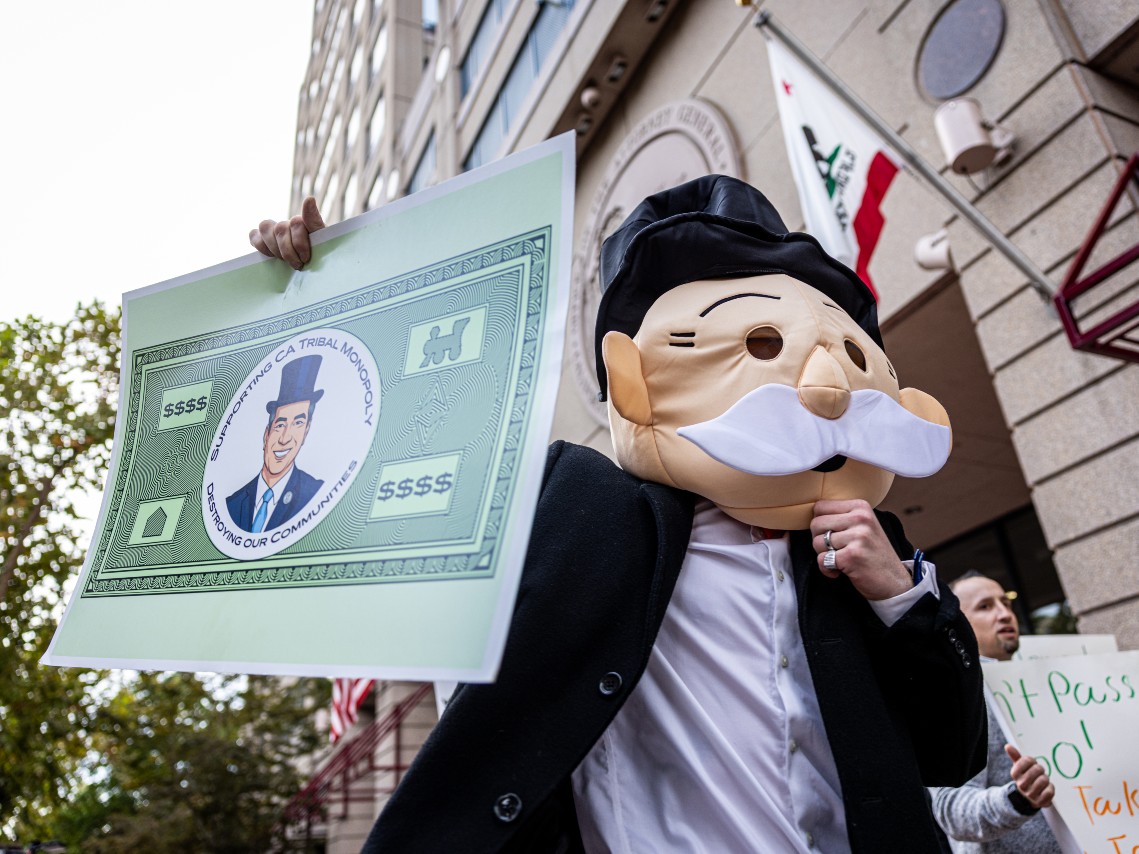Over 100 cardroom employees rallied in Sacramento Wednesday to protest proposed state gaming regulations that could severely impact their industry.
Outside California Attorney General Rob Bonta’s office, workers held Monopoly-themed signs with a person dressed as the “Monopoly man” spraying fake money with Bonta’s face on it, accusing him of favoring large tribal casinos.
It’s the latest battle with tribal casinos which sued cardrooms for infringing on their exclusivity rights to Las Vegas-style games.
Under California law, only native American tribes can run banked games. That means players at cardrooms aren’t allowed to bet against the “house.” Instead, establishments have independent Third Party Proposition Players Services (TPPPS) which bankroll games.
However, the new regulations would restrict TPPPS to only players physically at the table and require them to rotate every 40 minutes.
“If there’s nobody else who wants to take over the bank, the game would have to shut down. ” said Chris Linger, a dealer at Capital Casino in Sacramento. “Most people just want to play against the corporation. Nobody really likes banking.”
The regulations also effectively bans blackjack games from being offered by making significant rule changes including not having:
A “bust” feature where the player immediately loses if their hand exceeds the target point count.
A target point count of 21
The player or player-dealer immediately win if an initial hand includes an ace card and a 10 or a face card such as a king, queen, or jack.
Games that include the number 21 or the word “blackjack.
Cardroom employees don’t believe the regulations are sustainable.
“I work for my family, everybody else works for their family and [Bonta] is putting that at risk,” Linger said.
Cardroom employees pointed to severe impacts of the regulations laid out by the Standardized Regulatory Impact Assessment (SRIA) report commissioned by the California Department of Justice.
Regulations are estimated to cost cardrooms $464 million in lost revenue with benefits going towards tribal casinos of around $232 million, according to the report. The industry would also see 364 fewer new jobs created per year over the next decade.
Around 500 living-wage jobs in the Sacramento region would be impacted, according to a press release from the California Gaming Association.
Employees fear losing out on family-like work environments and opportunities for higher pay.
“We don’t have slot machines,” said Kurt Verdun, a floor man at Capital Casino. “We’re just like a mom-and-pop organization that’s trying to stay afloat.”
The City of Hawaiian Gardens in Los Angeles County has had to grapple with a potential loss in tax revenue generated by Hawaiian Gardens Casino which makes up 68% of its general fund.
“We know what that looks like,” said Shavon Moore-Cage, Executive Assistant to the City of Hawaiian Gardens. “During COVID, over 73 people from the city got laid off. That’s detrimental to us. Community programs are shut down, public safety programs are shut down, libraries are closed. It’s just detrimental.”
A CalMatters report showed Hawaiian Gardens Casino spent $9.1 million on lobbying efforts in 2023, the second highest amount reported to state regulators.
While tensions may be present, cardroom employees said the relationship with tribes doesn’t have to be contentious.
“Everybody has a right to have a good quality of life,” Moore-Cage said. “We just all want to be at peace. We don’t want to be at war with the tribes.”
Tribal leaders have long criticized cardrooms for illegally offering games that infringe on their exclusivity rights but lacked standing to sue due to their status as sovereign governments. That was until California Governor Gavin Newsom signed SB 549 in 2024 giving tribes one attempt.
However, Sacramento County Superior Court Judge Lauri Damre issued a tentative ruling Oct. 10 against the tribes stating the lawsuit was “preempted by federal law, and this Court lacks jurisdiction to resolve the Parties’ dispute. ” Tribes are expected to appeal.
The Bureau of Gambling Control took public comments on the matter in May of this year. The regulations are still under consideration.
CapRadio provides a trusted source of news because of you. As a nonprofit organization, donations from people like you sustain the journalism that allows us to discover stories that are important to our audience. If you believe in what we do and support our mission, please donate today.

